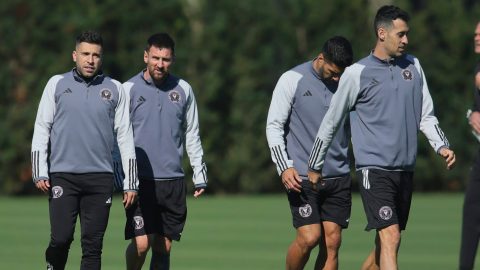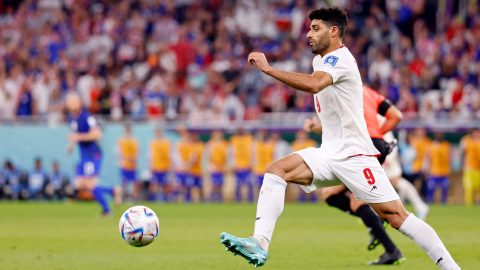 Michael Ballack retired from professional soccer Tuesday. The announcement came almost a year after he had already faded from on-field relevance.
Michael Ballack retired from professional soccer Tuesday. The announcement came almost a year after he had already faded from on-field relevance.
But the whimper of his career’s official ending can’t mask the sustained excellence and elegant torment which characterized the bulk of his 17-year professional career.
After two injury-plagued seasons, Ballack’s contract with Bayer Leverkusen expired in June. There was no chance of him returning to the German club after he fell out with coaches, teammates and directors in early 2012. Clubs in the United States and Australia were reportedly interested in signing the German legend, but those moves never materialized.
The 36-year-old’s retirement began in front of a national television audience (in the U.S.), as he worked as an on-air pundit for ESPN’s coverage of Euro 2012. Most assumed he still wanted to compete for club and country, but that desire fizzled out over the course of the summer. All that is left for Ballack the player is an empty future, the reality of the present and a glorious past.
Ballack burst onto the scene as one of the last of a dying breed of players. Born and raised behind the Iron Curtain in East Germany, he honed his skills through militarized discipline and repetition, becoming perfectly two-footed. He turned professional in 1995 with boyhood club Chemnitzer FC. Three years later, he was a German champion with newly promoted Kaiserslautern.
Ballack was a household name in unified Germany when he joined Leverkusen in 1999. His exploits for three clubs — Leverkusen, Bayern Munich and Chelsea — cemented his status as one of the greatest players of his generation, but his failure to lift soccer’s most prestigious trophies (either for club or country) may keep him from being mentioned among the all-time greats — Those whose careers are defined by success in the UEFA Champions League or major international tournaments like the FIFA World Cup and UEFA European Championships.
Domestic honors were never out of Ballack’s reach. From 1999-2010, his teams finished first or second in their domestic leagues nine times. Balllack’s Bayern won the Bundesliga in 2003, 2005 and 2006, while Chelsea captured the Premier League in 2010. He also won eight domestic cups during that 11-year span.
However, Champions League glory remained out of his grasp. Leverkusen lost to Real Madrid in the 2002 final. Chelsea fell to Manchester United on penalty kicks in 2008, and Bayern Munich would never contest a final with Ballack in the lineup (from 2003-06).
Germany’s fortunes during the Ballack era were intertwined with the player himself. He played 97 times for his country from 1999-2010, captaining his national team from 2004 until the bitter ending of his international career.
Ballack led Germany to the final of the 2002 World Cup, scoring in the quarterfinal and semifinal. Unfortunately, he was suspended for the final where Germany lost to Brazil. Nevertheless, he earned “team of the tournament” honors, a feat he would repeat at Euro 2004, World Cup 2006 and Euro 2008. For symmetry’s sake, the Ballack-fueled “Mannschaft,” as the German’s are known, lost to Spain in the final.
The German soccer revolution, which Jurgen Klinsmann kick-started and Joachim Low turbo-charged, eventually left the aging Ballack behind. Injuries cost him a place on the 2010 World Cup team, and the captaincy was unceremoniously handed to former Bayern teammate Philipp Lahm. Ballack thought he would retain it upon recovery, but the German federation (DFB) felt he had outlived his usefulness to the national team. He rejected the DFB’s offer of playing in a special farewell tour, aimed at bringing him to the magical 100-appearance mark.
The former superstar wasn’t interested in gimmicks or handouts, as he worked hard for his many achievements. So he announced that he’s had enough of the professional game, according to the BBC.
“The last few months without playing football have shown me that the time had come to give it up,” he said. “I am now looking forward to the next chapter in my life and would like to thank my family and all the amazing people who have supported me, pushed me and accompanied me. They have made a major contribution to my success.”
For Ballack, there will be no Lothar Matthäus-style American adventure. He won’t be going to the famous Opera House in Sydney, Australia with Alessandro Del Piero. What he does next will be whatever he thinks is best for him and his family.
Ballack has earned the opportunity to do what other past greats have done: stay in the game in another capacity. He could try his hand at coaching, management or even becoming a director at the club or federation level. He could stay in the media if he wants. It would be a shame if any doors closed in his face after such a storied career.
Have a question for Marcus Kwesi O’Mard? Send it to him via Twitter at @NESNsoccer, NESN Soccer’s Facebook page or send it here. He will pick a few questions to answer every week for his mailbag.
Photo via Facebook/Clutchtime PR



